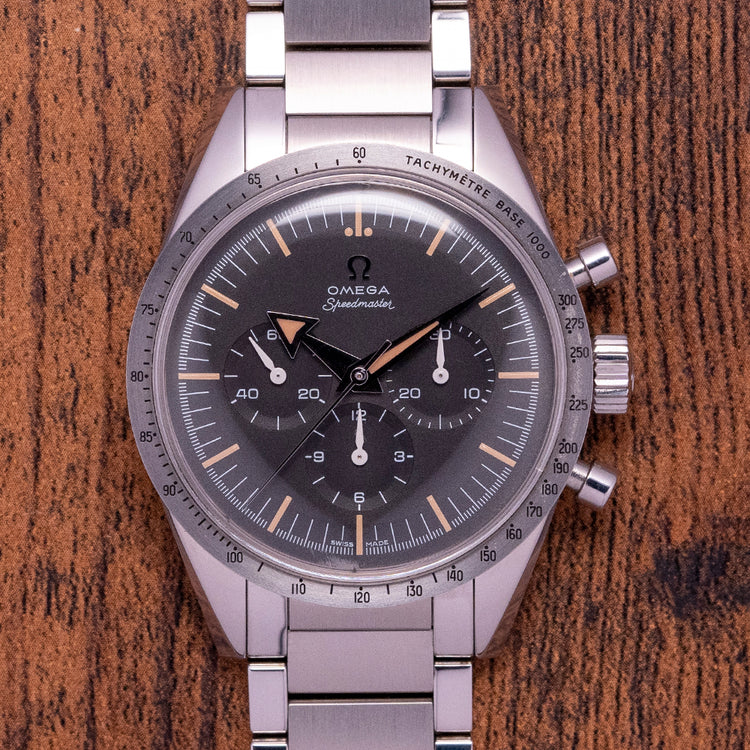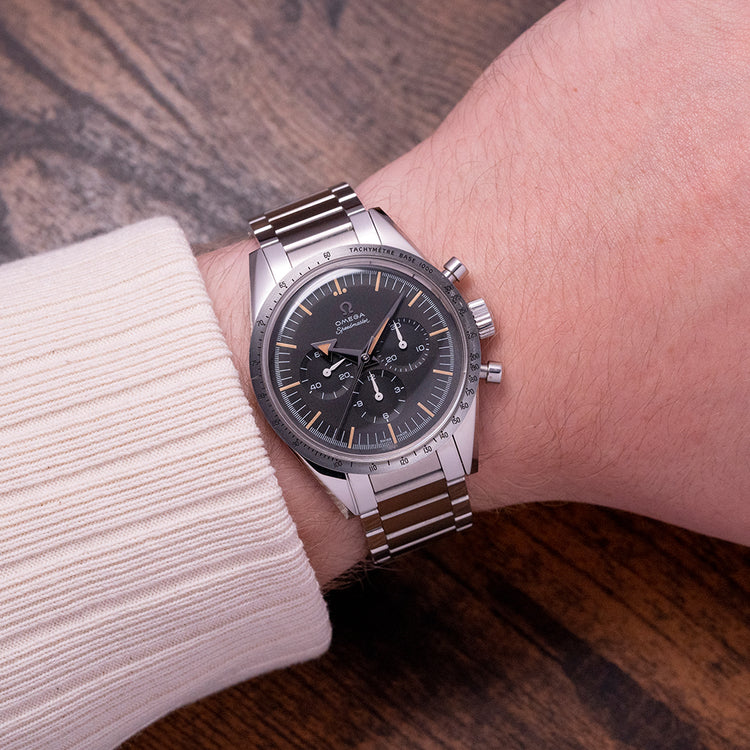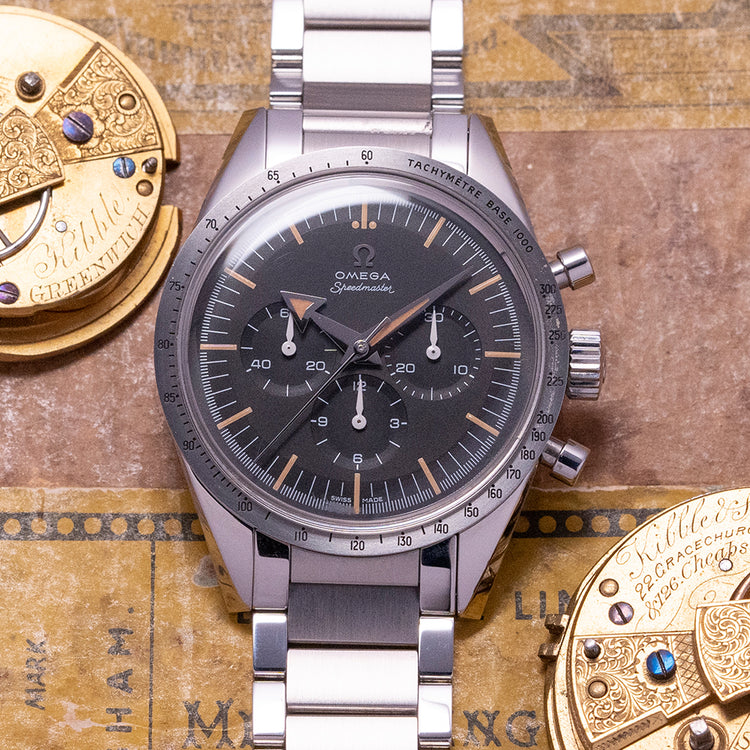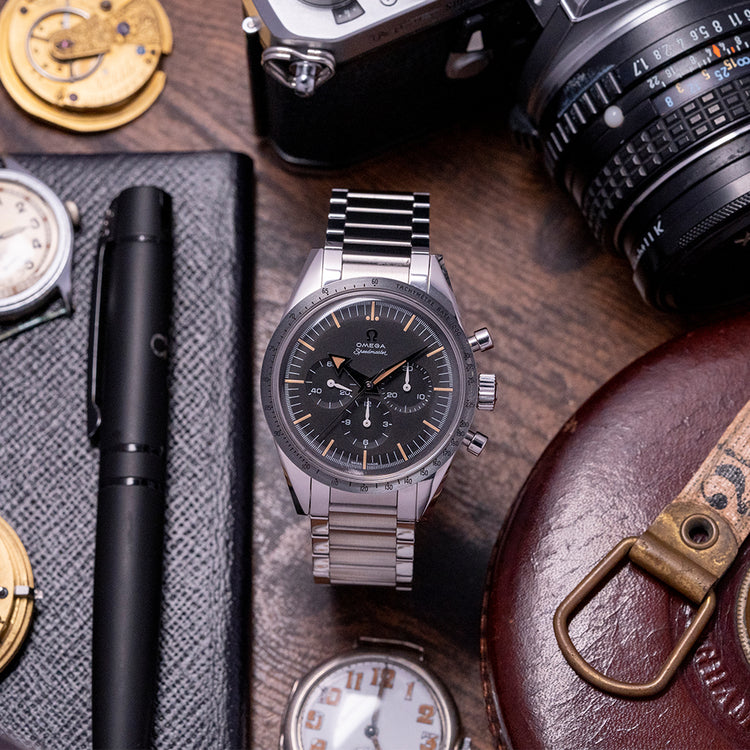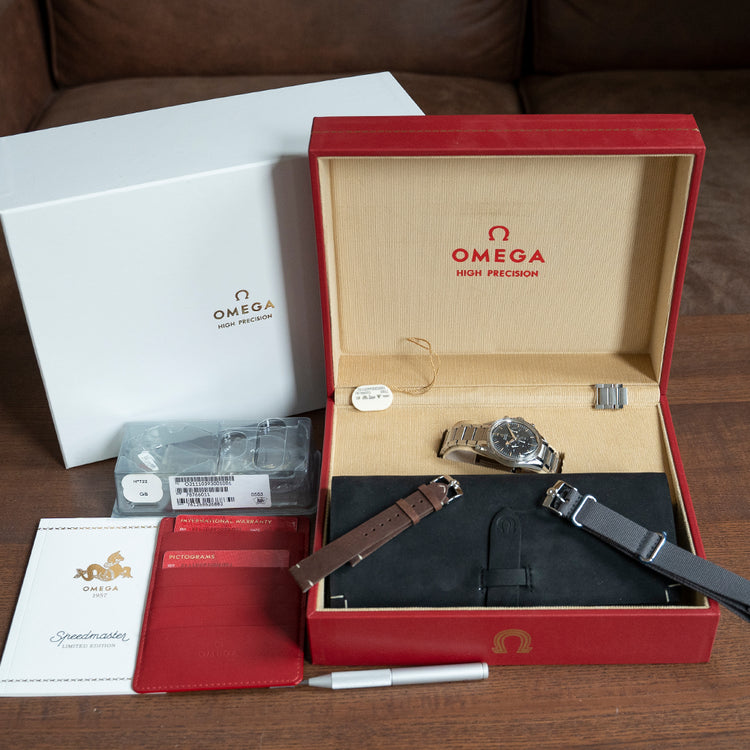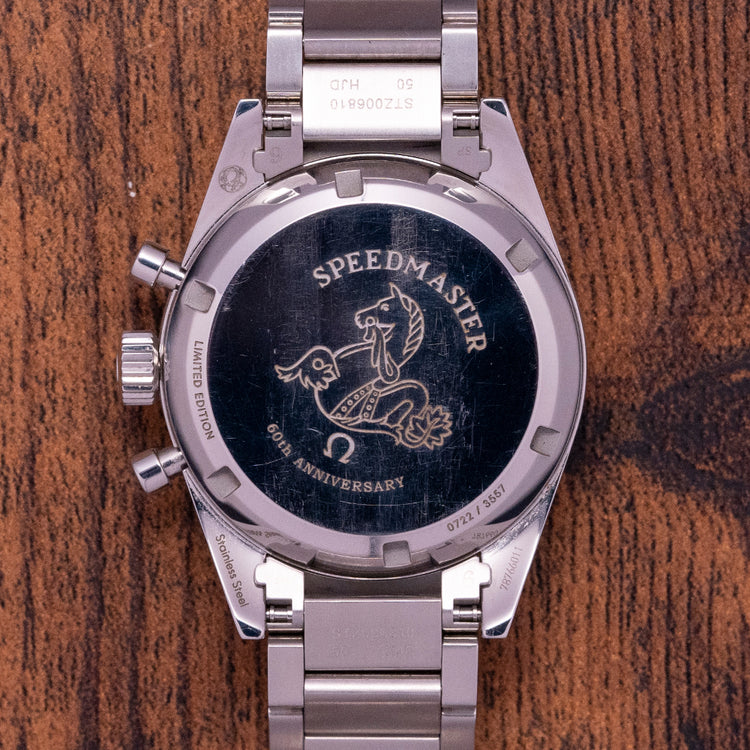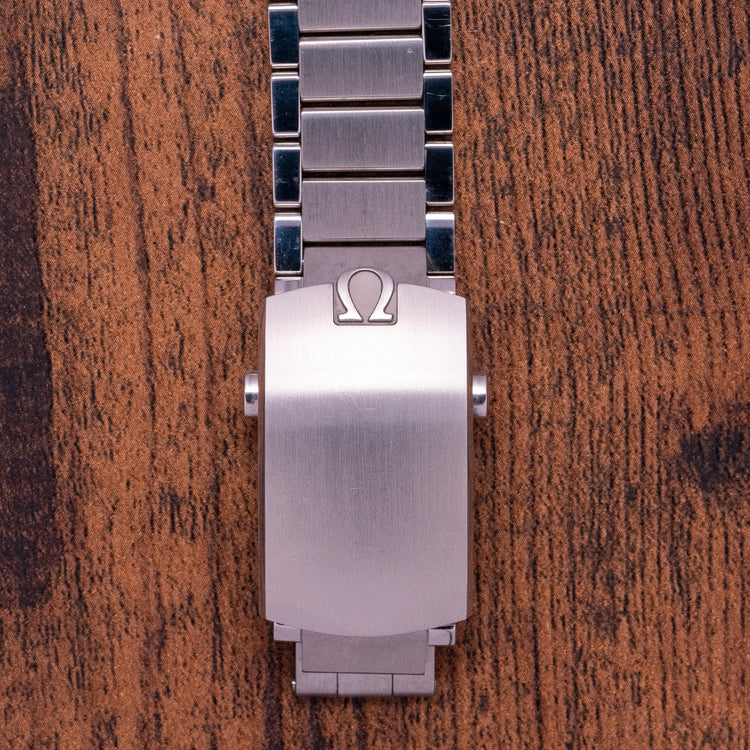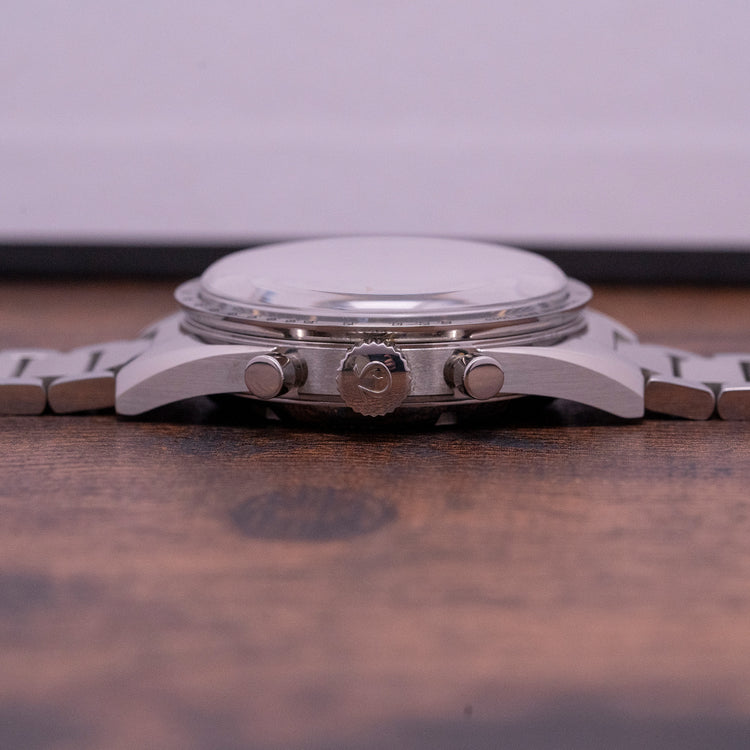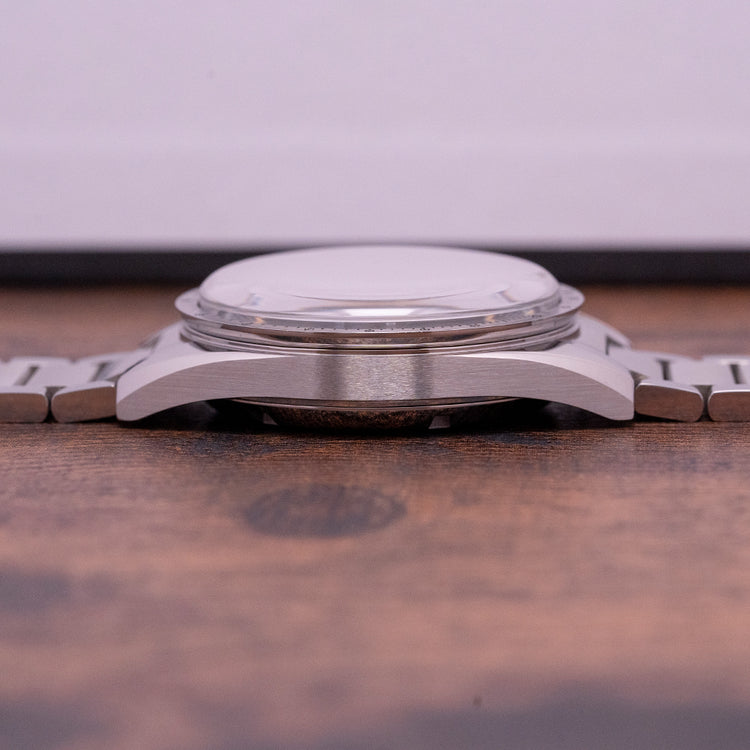More Information
Description
More
Less
The Watch
This Omega Speedmaster Trilogy 1957 Limited Edition, limited to 3557 pieces, was released at BaselWorld in 2017. It is part of the Omega 1957 Trilogy Speedmaster, Seamaster 300, and Railmaster 60th Anniversary. Omega used digital scanning technology, which provided accurate representations of the original watches, they are some of the closest reissues to the originals we have ever seen, based on the original 1957 “Broad Arrow”, which was not only the first Speedmaster, it was also the first chronograph wristwatch in the world with its tachymeter scale on the bezel. This is the limited edition number "722/3557". The 38.5mm brushed asymmetric case has brushed and polished surfaces, and tapered lugs provide a comfortable fit on your wrist, with a lug-to-lug length of 48mm and a thickness of 13.5mm giving the watch an impressive wrist presence. On the right side, we have the prominent pushers and a signed crown in the centre. A thin brushed stainless steel bezel has the Tachymeter scale engraved into it and is painted black, domed hesalite crystal with the Omega symbol in the centre sits above a textured black dial. The batons have been coated in Super-LumiNova that has a vintage tint to them giving it the appearance of aged luminescence. The three registers are slightly recessed, at 3 o’clock 30 minutes, at 6 o’clock 12 hours and finally at 9 o’clock small seconds. Steel Broad Arrow hands have the same-aged Super-LumiNova. On the reverse, an engraved Hippocampus and 60th Anniversary, inside a manually wound Omega Cal. 1861, 18 jewels, hand-wound Chronograph beating at 21,600 bph, it has a Rhodium-plated finish. As a manual wound movement, it is the direct descendant of the original moon watch that used the Cal. 361 movement. The watch comes fitted on its 19mm Omega stainless steel flat link bracelet with polished outer links and brushed inner links, secured by screws and fitted with a push button-release folding clasp, plus an additional two 19mm Omega straps in the box and the watch comes with its special Omega presentation box, travel case, swing tag, spring bar removal tool and papers.
Points of Mention
This watch is being sold with its original Omega special box, travel case, swing tag, swing bar removal tool and paperwork, along with all of its accompanying straps. The included 19mm Omega stainless steel flat link bracelet features polished outer links and brushed inner links, secured by screws and fitted with a push button-release folding clasp, with all links included. Additionally, two extra 19mm Omega straps are included in the box. This watch is sold in worn condition, a full case and bracelet refurb can be provided at an additional cost, and the crystal will be polished prior to shipping. The watch comes with our 12-Months NON-Waterproof Warranty.
For more photos see here - https://drive.google.com/drive/folders/1XSnm_3Nnk0j1UqmLtmGp6L-Iiw6XnADc?usp=drive_link
4K YouTube video, skip to 12:08 - https://youtu.be/hgyiyaQOhAE
Personal Note
Easily one of my all-time favourite modern Speedmasters, but that will come as no surprise being a vintage fan! If you've been after one of these, I wouldn't hesitate as they don't come up too often despite how many were made, a testament to owners loving and keeping them for the most part!
Specification
Lugs : 19mm
Condition : Pre-Owned
Box & Papers : Box & Papers
Case Material : Stainless Steel
Warranty : 12-Months NON-Waterproof Warranty
The Brand
Formerly known as the La Generale Watch Co. in 1848 founded by Louis Brandt in La Chaux-de-Fonds. When he died in 1879, his sons carried on his dream. In 1880 they moved to 96 Rue Jakob-Stampfli where they remain today. The brothers produced their first mass-produced calibre, the Labrador In 1885. Just a few years later in 1892, they produced the first minute-repeater. In 1903 they renamed the company Omega until 1982 when they officially changed their name to Omega SA. During WW1 Omega watches were used as official timekeepers for the Royal Flying Corps and the US Army. In 1930, Omega and Tissot merged together to form Société Suisse pour l'Industrie Horlogère (SSIH) In 1931, another group was formed - Allgemeine Schweizerische Uhrenindustrie AG (ASUAG). Where SSIH was primarily French-speaking, ASUAG was founded by the more German-speaking members of the Swiss watch industry. In 1948 they introduced the first edition of one of its most symbolic watches: the Seamaster. Omega first introduced the Constellation in 1952. At the time it was Omega's flagship timepiece. The first models had a Cal. 354 bumper movement in them. Later in 1955, Omega introduced the Automatic Cal. 50x, followed in 1959 by the Cal.55x (no date) and 56x (date) versions. Many of the Constellations came with pie-pan dials, diamond indexes, and fancy lug configurations. All the gold Constellations of that time have the Observatory of Geneva's hand engraved on the back. The stainless steel and stainless steel/gold versions had a gold medallion on the back with the Observatory of Geneva. The eight stars above the Observatory stand for the many exploits of Omega in the world Chronometer competition. Celebrating the fact that all Constellations are Chronometer Certified. In 1962, when astronaut Wally Schirra wore a Speedmaster on his Mercury Sigma 7 Mission, making it the first Omega watch to enter space. After rigorous tests, NASA used Omega for all their Apollo missions including the 1969 Moon landing of Apollo 11. Today Omega is still an astronaut's first choice. In 1969, President Nixon famously said it was “too valuable” and turned down the first-ever all-gold Speedmaster Professional Deluxe. As a response to the ever-growing threat of electronic watches to the manufacturers of mechanical watches, Omega and many Swiss brands such as Rolex and Patek Philippe formed Centre Electronique Horologer (CEH). Prototypes began to appear in 1967 with their production starting in 1968. Then In 1972, Omega introduced the reference, 198.030, which included the Omega calibre 1250, a ‘tuning-fork electronic movement which was made under licence from Bulova. Later we saw a merger of SSIH and ASUAG into SMH, or Société de Microélectronique et d’Horlogerie. This merger took place in 1983. In 1992, the company acquired Blancpain, and in 1998 it officially rebranded itself from SMH to the Swatch Group. Then, in 1999, they purchased and integrated Breguet into the Swatch Group.
Points of Mention
More
Less
Personal Note
More
Less
Specification
More
Less
Movement : Manually Wound Omega Cal. 1861
Age : June 2020
Year : 2020
Case Size : 40mm
Case Thickness : 13.5 mm
Lug to Lug : 48mm
Lugs : 19mm
Condition : Pre-Owned
Case Material : Stainless Steel
Warranty : 12-Months NON-Waterproof Warranty
The wrist model's wrist size is 7inch
About Omega
More
Less
Description
The Watch
This Omega Speedmaster Trilogy 1957 Limited Edition, limited to 3557 pieces, was released at BaselWorld in 2017. It is part of the Omega 1957 Trilogy Speedmaster, Seamaster 300, and Railmaster 60th Anniversary. Omega used digital scanning technology, which provided accurate representations of the original watches, they are some of the closest reissues to the originals we have ever seen, based on the original 1957 “Broad Arrow”, which was not only the first Speedmaster, it was also the first chronograph wristwatch in the world with its tachymeter scale on the bezel. This is the limited edition number "722/3557". The 38.5mm brushed asymmetric case has brushed and polished surfaces, and tapered lugs provide a comfortable fit on your wrist, with a lug-to-lug length of 48mm and a thickness of 13.5mm giving the watch an impressive wrist presence. On the right side, we have the prominent pushers and a signed crown in the centre. A thin brushed stainless steel bezel has the Tachymeter scale engraved into it and is painted black, domed hesalite crystal with the Omega symbol in the centre sits above a textured black dial. The batons have been coated in Super-LumiNova that has a vintage tint to them giving it the appearance of aged luminescence. The three registers are slightly recessed, at 3 o’clock 30 minutes, at 6 o’clock 12 hours and finally at 9 o’clock small seconds. Steel Broad Arrow hands have the same-aged Super-LumiNova. On the reverse, an engraved Hippocampus and 60th Anniversary, inside a manually wound Omega Cal. 1861, 18 jewels, hand-wound Chronograph beating at 21,600 bph, it has a Rhodium-plated finish. As a manual wound movement, it is the direct descendant of the original moon watch that used the Cal. 361 movement. The watch comes fitted on its 19mm Omega stainless steel flat link bracelet with polished outer links and brushed inner links, secured by screws and fitted with a push button-release folding clasp, plus an additional two 19mm Omega straps in the box and the watch comes with its special Omega presentation box, travel case, swing tag, spring bar removal tool and papers.
Points of Mention
This watch is being sold with its original Omega special box, travel case, swing tag, swing bar removal tool and paperwork, along with all of its accompanying straps. The included 19mm Omega stainless steel flat link bracelet features polished outer links and brushed inner links, secured by screws and fitted with a push button-release folding clasp, with all links included. Additionally, two extra 19mm Omega straps are included in the box. This watch is sold in worn condition, a full case and bracelet refurb can be provided at an additional cost, and the crystal will be polished prior to shipping. The watch comes with our 12-Months NON-Waterproof Warranty.
For more photos see here - https://drive.google.com/drive/folders/1XSnm_3Nnk0j1UqmLtmGp6L-Iiw6XnADc?usp=drive_link
4K YouTube video, skip to 12:08 - https://youtu.be/hgyiyaQOhAE
Personal Note
Easily one of my all-time favourite modern Speedmasters, but that will come as no surprise being a vintage fan! If you've been after one of these, I wouldn't hesitate as they don't come up too often despite how many were made, a testament to owners loving and keeping them for the most part!
Specification
Lugs : 19mm
Condition : Pre-Owned
Box & Papers : Box & Papers
Case Material : Stainless Steel
Warranty : 12-Months NON-Waterproof Warranty
The Brand
Formerly known as the La Generale Watch Co. in 1848 founded by Louis Brandt in La Chaux-de-Fonds. When he died in 1879, his sons carried on his dream. In 1880 they moved to 96 Rue Jakob-Stampfli where they remain today. The brothers produced their first mass-produced calibre, the Labrador In 1885. Just a few years later in 1892, they produced the first minute-repeater. In 1903 they renamed the company Omega until 1982 when they officially changed their name to Omega SA. During WW1 Omega watches were used as official timekeepers for the Royal Flying Corps and the US Army. In 1930, Omega and Tissot merged together to form Société Suisse pour l'Industrie Horlogère (SSIH) In 1931, another group was formed - Allgemeine Schweizerische Uhrenindustrie AG (ASUAG). Where SSIH was primarily French-speaking, ASUAG was founded by the more German-speaking members of the Swiss watch industry. In 1948 they introduced the first edition of one of its most symbolic watches: the Seamaster. Omega first introduced the Constellation in 1952. At the time it was Omega's flagship timepiece. The first models had a Cal. 354 bumper movement in them. Later in 1955, Omega introduced the Automatic Cal. 50x, followed in 1959 by the Cal.55x (no date) and 56x (date) versions. Many of the Constellations came with pie-pan dials, diamond indexes, and fancy lug configurations. All the gold Constellations of that time have the Observatory of Geneva's hand engraved on the back. The stainless steel and stainless steel/gold versions had a gold medallion on the back with the Observatory of Geneva. The eight stars above the Observatory stand for the many exploits of Omega in the world Chronometer competition. Celebrating the fact that all Constellations are Chronometer Certified. In 1962, when astronaut Wally Schirra wore a Speedmaster on his Mercury Sigma 7 Mission, making it the first Omega watch to enter space. After rigorous tests, NASA used Omega for all their Apollo missions including the 1969 Moon landing of Apollo 11. Today Omega is still an astronaut's first choice. In 1969, President Nixon famously said it was “too valuable” and turned down the first-ever all-gold Speedmaster Professional Deluxe. As a response to the ever-growing threat of electronic watches to the manufacturers of mechanical watches, Omega and many Swiss brands such as Rolex and Patek Philippe formed Centre Electronique Horologer (CEH). Prototypes began to appear in 1967 with their production starting in 1968. Then In 1972, Omega introduced the reference, 198.030, which included the Omega calibre 1250, a ‘tuning-fork electronic movement which was made under licence from Bulova. Later we saw a merger of SSIH and ASUAG into SMH, or Société de Microélectronique et d’Horlogerie. This merger took place in 1983. In 1992, the company acquired Blancpain, and in 1998 it officially rebranded itself from SMH to the Swatch Group. Then, in 1999, they purchased and integrated Breguet into the Swatch Group.
Points of Mention
Personal Note
Specification
The Brand
Enquire or Book an Appointment
Would you like to discover further details about this watch, or perhaps arrange an appointment to view and try it on? Complete this form and a member of our team will get back to you shortly.
You May Also Like




















